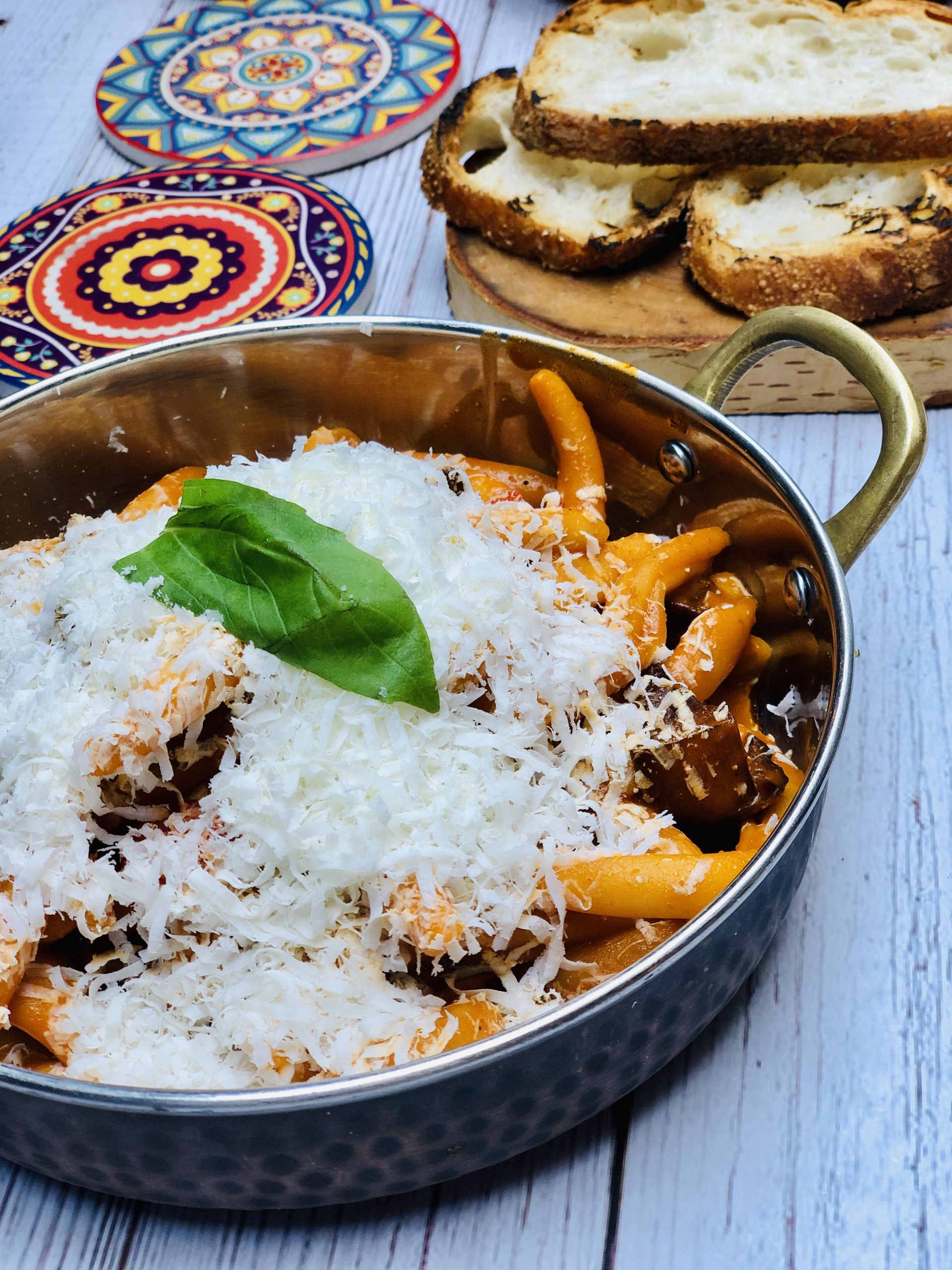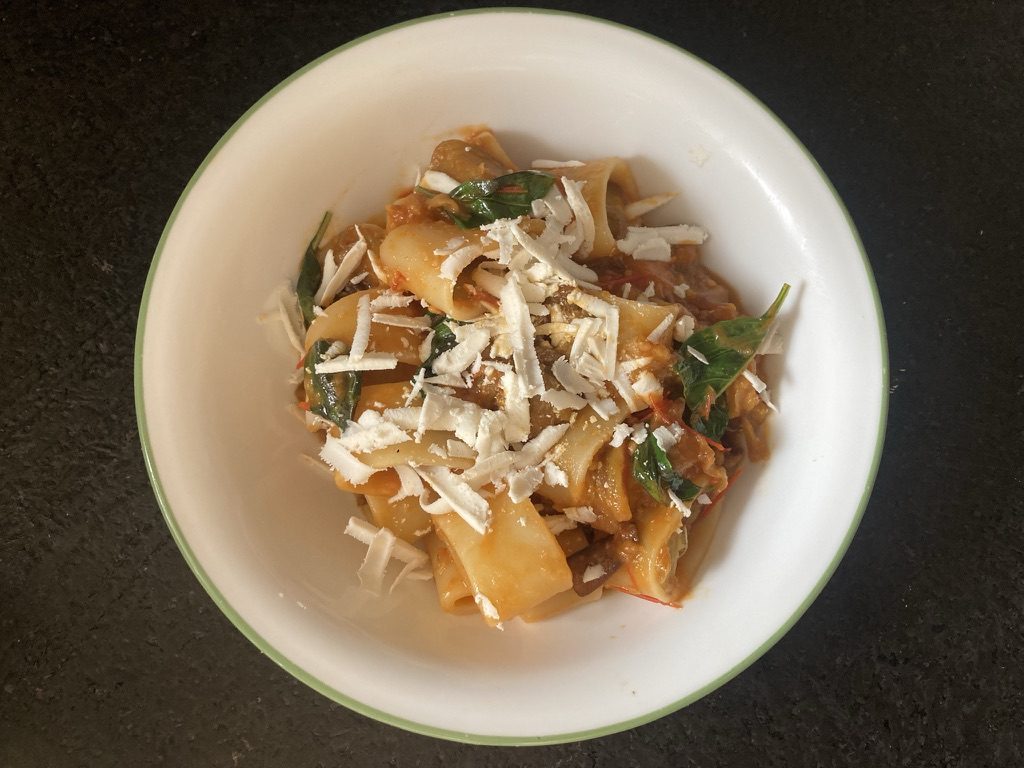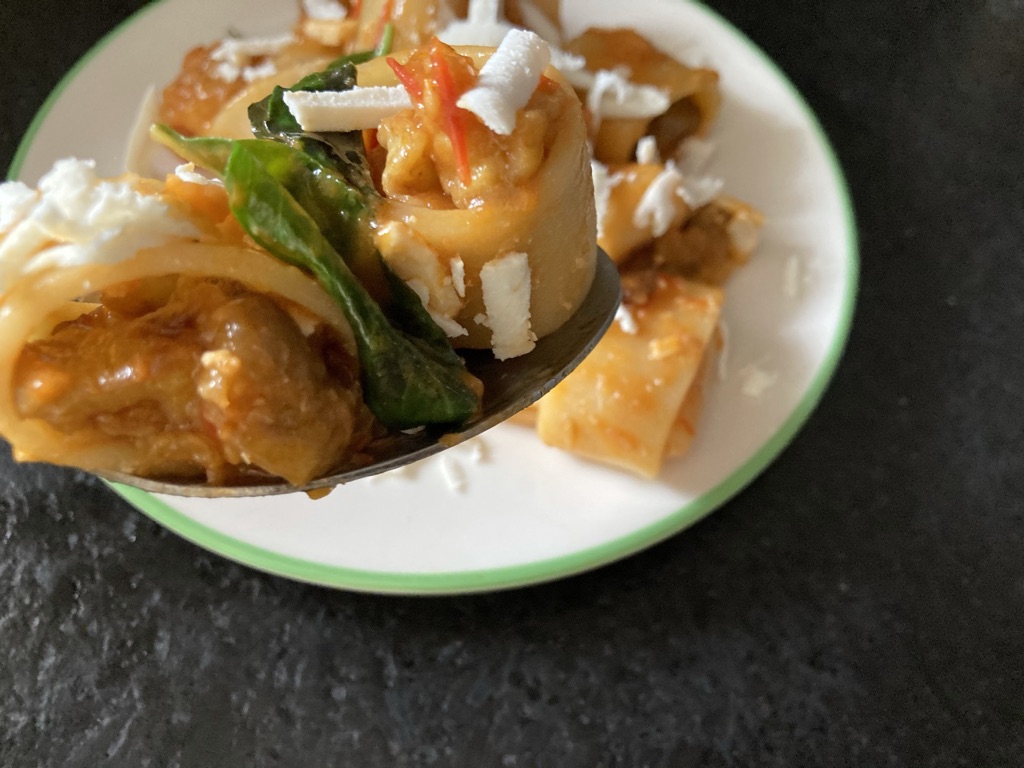
Pasta alla Norma
There’s nothing normal about alla Norma, a Sicilian way of serving pasta smothered in an eggplant tomato sauce. If you enjoy ratatouille, iman bayildi, eggplant Parmesan or any other eggplant and tomato dish, you probably understand that they form a special combination. Although the resemblance may not be obvious at first, the two fruits are close relatives, sharing not only the same plant family but also the same genus — which means they are closer than they look to being the same species. When you put them together and apply heat, magic happens in the pan.
Pasta alla Norma is named after an opera by the Sicilian composer Vincenzo Bellini, and christened by the poet Nino Martoglio, also of Sicily, who tried a bite and declared it to be the “Norma” of pasta. The best, in other words. It didn’t hurt that the soprano for whom Bellini wrote the opera had the fortunate name Guiditta Pasta.
Centuries later, alla Norma lives on at the foot of Montana’s Beartooth Mountains, where Chef Philip Guardione of the acclaimed Piccola Cucina in Red Lodge serves alla Norma with a house made maccheroni pasta. “Pasta alla Norma was our family’s binding agent on Sundays,” the told me. “I have many related childhood memories, like when my grandma was in the kitchen and the smell of her tomato sauce and eggplants would welcome you the minute you opened the front door.”
These days, when the tomatoes and eggplant are fresh and abundant, it’s easy to whip up a quick Norma.
Guardione kindly shared his recipe for maccheroni alla Norma. There are two recipes, really, because enroute to Norma we learn an easy pan-fried tomato sauce. It’s abnormally good, when you put it all together. A brilliant representation of the glory and power of tomatoes and eggplants. Meaty and satisfying, it leaves you wanting more. It might even make you break into an emotional aria.
Pasta alla Norma (alla Chef Philip Guardione)
I’ve lightly edited Chef Guardione’s recipe for clarity. Below it, I’ve added some notes of my own on pasta in general, and how to follow this recipe.
Ingredients:
500 g (1 lb) of cherry or grape tomatoes
2 tablespoons of extra virgin olive oil for the sauté
2 cloves of garlic, chopped
350 g (12 oz) pasta
Salt for the water, and for seasoning
½ liter (2 cups) of extra virgin olive oil for frying
500 g (1 lb) eggplants
10 leaves of fresh basil
200 g (7 oz) ricotta salata cheese, grated
Steps:
Rinse and dry the tomatoes and cut them into pieces. In a large saucepan, pour two tablespoons of extra virgin olive oil and sauté the garlic. Cook for two-to-three minutes.
Add the tomatoes, stir, and cover with a lid. Cook over low heat until the tomatoes are soft and have released their juices — about 20 minutes. Allow to cool for 15 minutes.
Transfer the tomatoes to a vegetable mill or blender and puree.
Pour the tomato sauce back into the saucepan, salt and let simmer for 10-15 minutes until it has thickened.
Rinse and dry the eggplants, then chop them in ½-inch cubes. Toss the cubes in ½ teaspoon of salt.
Heat the extra virgin olive oil at about 340F — medium/high-ish, if you’re guessing — fry the eggplant pieces until golden brown, about five minutes. Drain the eggplant.
In a large pot, bring salted water to a boil. Cook the pasta al dente.
Add the eggplant to the sauce. Simmer for five minutes. Add the pasta and basil leaves to the sauce. Stir well.
Plate the pasta and garnish with plenty of ricotta salata cheese
Ari’s notes:
The pasta: If not homemade, it should be 100% semolina. Furthermore, the package should specify that the pasta within had been dried in cold air. I like pieces with nooks and crannies to hold the eggplant chunks.
Immediately after cooking the pasta, toss it in olive oil and freshly pressed or minced garlic (not that crap from a jar). Add these dressed noodles to the sauce. (I do this step to every pasta dish I make.)
When deep-frying the eggplant like this, I was surprised at how little oil it absorbed — less than half a cup!
I added a cup of the pasta water to the sauce to dilute it to the point that my blender had enough to work with. I then cooked off the excess water.

